- Home
- Tom Sharpe
The Throwback
The Throwback Read online
Contents
About the Author
Also by Tom Sharpe
Title Page
Chapter 1
Chapter 2
Chapter 3
Chapter 4
Chapter 5
Chapter 6
Chapter 7
Chapter 8
Chapter 9
Chapter 10
Chapter 11
Chapter 12
Chapter 13
Chapter 14
Chapter 15
Chapter 16
Chapter 17
Chapter 18
Chapter 19
Chapter 20
Chapter 21
Chapter 22
Copyright
About the Author
Tom Sharpe was born in 1928 and educated at Lancing College and Pembroke College, Cambridge. He did his national service in the Marines before going to South Africa in 1951, where he did social work before teaching in Natal. He had a photographic studio in Pietermaritzburg from 1957 until 1961, and from 1963 to 1972 he was a lecturer in History at the Cambridge College of Arts and Technology.
He is the author of sixteen novels, including Porterhouse Blue and Blott on the Landscape which were serialised on television, and Wilt which was made into a film. In 1986 he was awarded the XXIIIème Grand Prix de l’Humour Noir Xavier Forneret and in 2010 he received the inaugural BBK La Risa de Bilbao Prize. Tom Sharpe died in 2013.
Also by Tom Sharpe
Riotous Assembly
Indecent Exposure
Porterhouse Blue
Blott on the Landscape
Wilt
The Great Pursuit
The Wilt Alternative
Ancestral Vices
Vintage Stuff
Wilt on High
Grantchester Grind
The Midden
Wilt in Nowhere
The Gropes
The Wilt Inheritance
The Throwback
Tom Sharpe
1
It could be said of Lockhart Flawse when he carried his bride, Jessica, née Sandicott, across the threshold of 12 Sandicott Crescent, East Pursley, Surrey, that he was entering into married life with as little preparedness for its hazards and happiness as he had entered the world at five past seven on Monday, 6 September 1956, promptly killing his mother in the process. Since Miss Flawse had steadfastly refused to name his father even on the stinging nettles that composed her deathbed and had spent the hour of his delivery and her departure alternately wailing and shouting ‘Great Scot!’, it had devolved upon his grandfather to name the infant Lockhart after the great Scott’s biographer and, at some risk to his own reputation, to allow Lockhart to assume the surname Flawse for the time being.
From that moment Lockhart had been allowed to assume nothing, not even a birth certificate. Old Mr Flawse had seen to that. If his daughter had been so obviously devoid of social discretion as to give birth to a bastard under a drystone wall while out cub-hunting, which drystone wall her horse had, more sensibly than she, refused, Mr Flawse was determined to ensure that his grandson grew up with none of his mother’s faults. He had succeeded. At eighteen Lockhart knew as little about sex as his mother had known or cared about contraception. His life had been spent under the care of several housekeepers and later half a dozen tutors, the former chosen for their willingness to endure the bed and board of old Mr Flawse, and the latter for their other-worldliness.
Since Flawse Hall was situated on Flawse Fell close under Flawse Rigg some seventeen miles from the nearest town and on the bleakest expanse of moorland north of the Roman Wall, only the most desperate of housekeepers and other-worldly of tutors accepted the situation for long. There were other rigours than the natural. Mr Flawse was an extremely irritable man and the succession of tutors who had provided Lockhart with the most particular of general educations had done so under the strict proviso that Ovid was not to be included among the classics and that literature was to be dispensed with entirely.
Lockhart was to be taught the ancient virtues and mathemathics. Mr Flawse was particularly hot on mathematics and believed in numbers as ferociously as his forefathers had believed in predestination and cattle-rustling. They formed in his opinion a firm foundation for a commercial career and were as entirely without obvious sexual connotations as were the features of his housekeepers. Since tutors, and other-worldly tutors at that, seldom combined a knowledge of both maths and the classics, Lockhart’s education proceeded by fits and starts but was sufficiently thorough to defeat every attempt by the Local Authorities to provide him with a more orthodox schooling at public expense. The School Inspectors who ventured to Flawse Hall to obtain evidence that Lockhart’s education was deficient came away confounded by his narrow erudition. They were unused to small boys who could recite their nineteen-times table in Latin and read the Old Testament in Urdu. They were also unused to conducting examinations in the presence of an old man who appeared to be toying with the trigger of an ostentatiously loaded shotgun aimed absent-mindedly in their direction. In the circumstances they felt that Lockhart Flawse, while hardly in safe hands, was educationally in excellent ones and that there was nothing to be gained, except in all probability a volley of buckshot, by attempting to take him into public care, a point of view that was shared by his tutors, who came less frequently with every passing year.
Mr Flawse made good their absence by teaching Lockhart himself. Born in 1887 at the height of the Empire, he still held those tenets to be true which had been commonplace in his youth. The British were the finest specimens of animal life that God and Nature had created. The Empire was still the greatest that had ever existed. Wogs began at Calais, and sex was necessary for procreation but was otherwise unmentionable and generally disgusting. The fact that the Empire had long since ceased to exist and that wogs, far from beginning at Calais, had reversed the process and in large measure ended at Dover, Mr Flawse ignored. He took no newspaper and, lacking any electricity at Flawse Hall, used this as an excuse for refusing to have even a transistor radio, let alone a television set, in the house. Sex, on the other hand, he couldn’t ignore. Even at ninety he was consumed by guilt at his own excesses and the fact that these, like the Empire, had largely passed from reality to fantasy only made matters worse. In his mind Mr Flawse remained a profligate and maintained a regimen of cold baths and long walks to exercise his body and exorcize his soul. He also hunted and fished and shot and encouraged his bastard grandson in these healthy outdoor pursuits to the point where Lockhart could bring down a running hare at five hundred yards with a First World War .303 Lee-Enfield and a grouse at a hundred with a .22. By the time he was seventeen Lockhart had so decimated the wildlife on Flawse Fell and the fish in the North Teen that even the foxes, carefully preserved from relatively painless death by gunshot to be hunted and torn to pieces by the hounds, found it difficult to make ends meet, and brought meets to an end by moving off to less exacting moors. It was largely in consequence of this migration, which coincided with the departure of his latest and most desirable housekeeper, that old Mr Flawse, resorting too heavily to the port bottle and the literary companionship of Carlyle, was urged by his personal physician, Dr Magrew, to take a holiday. The doctor was supported by Mr Bullstrode, the solicitor, at one of the monthly dinners at Flawse Hall which the old man had given for thirty years and which allowed him a forum for those vociferous disputations on things eternal, metaphysical, biological and generally slanderous. These dinners were his substitute for church attendance, and his arguments afterwards were his nearest approach to any recognizable religion.
‘Damned if I will,’ he said when Dr Magrew first mooted the idea of a holiday. ‘And the fool who first said a change is as good as a rest didn’t live in this
benighted century.’
Dr Magrew helped himself to more port. ‘You can’t live in an unheated house without a housekeeper and expect to last another winter.’
‘I’ve got Dodd and the bastard to look after me. And the house isn’t unheated. There’s coal in the drift mine up Slimeburn and Dodd brings it down. The bastard does the cooking.’
‘And that’s another thing,’ said Dr Magrew, who rather suspected that Lockhart had cooked their dinner, ‘your digestion won’t stand the strain and you can’t expect to keep the boy cooped up here for ever. It’s time he saw something of the world.’
‘Not till I find out who his father is,’ said Mr Flawse malevolently. ‘And when I do I’ll horsewhip the swine to within an inch of his life.’
‘You’ll not be fit to horsewhip anyone unless you take our advice,’ said Dr Magrew. ‘Isn’t that your opinion, Bullstrode?’
‘Speaking as your friend and legal adviser,’ said Mr Bullstrode, glowing in the candlelight, ‘I would say that I would regret the premature ending of these pleasant occasions by virtue of an obstinate disregard for the weather and our advice. You’re not a young man and the question of your will …’
‘Damn my will, sir,’ said old Mr Flawse, ‘I’ll make a will when I know whom I’m settling my money on and not before. And what is this advice you offer so readily?’
‘Take a cruise,’ said Mr Bullstrode, ‘somewhere hot and sunny. I’m told the food is excellent.’
Mr Flawse stared into the depths of the decanter and considered the proposition. There was something in what his friends advised and besides there had recently been complaints from several tenant farmers that Lockhart, lacking any more fleet-footed quarry, had taken to pot-shooting sheep at fifteen hundred yards, complaints that had been confirmed by Lockhart’s cuisine. They had had underdone mutton too frequently of late for Mr Flawse’s digestion and conscience, and besides Lockhart was eighteen and it was high time he got shot of the lad before someone got shot by him. As if to reinforce this opinion there came the sound from the kitchen of Mr Dott’s Northumbrian pipes playing a melancholy air while Lockhart sat opposite him listening, just as he listened to Mr Dodd’s stories of the grand old days and the best way to poach pheasant or tickle trout.
‘I’ll think about it,’ Mr Flawse said finally.
*
That night a heavy fall of snow decided him, and Dr Magrew and Mr Bullstrode came down to breakfast to find him in a more amenable mood.
‘I’ll leave the arrangements to you, Bullstrode,’ he said as he finished his coffee and lit a blackened pipe. ‘And the bastard will go with me.’
‘He’ll need a birth certificate to get a passport,’ said the solicitor, ‘and …’
‘Born in a ditch and die in a dyke. I’ll only register him when I know who his father is,’ said Mr Flawse, glowering.
‘Quite,’ said Mr Bullstrode, who didn’t want to go into the question of horsewhipping so early in the morning. ‘I suppose we could still have him put on your passport.’
‘Not as his father,’ snarled Mr Flawse, the depths of whose feelings for his grandson were partly to be explained by the terrible suspicion that he himself might not altogether be devoid of responsibility for Lockhart’s conception. The memory of one drunken encounter with a housekeeper who had seemed on recollection to have been younger and more resistant than her daytime appearance had led him to expect still haunted his conscience. ‘Not as his father.’
‘As his grandfather,’ said Mr Bullstrode. ‘I’ll need a photograph.’
Mr Flawse went through to his study, rummaged in a bureau drawer and returned with one of Lockhart aged ten. Mr Bullstrode studied it dubiously.
‘He’s changed a lot since then,’ he said.
‘Not to my knowledge,’ said Mr Flawse, ‘and I should know. He was ever a gormless lout.’
‘Aye, and for all practical purposes a non-existent one,’ said Dr Magrew. ‘You know he’s not registered on the National Health system, and if he’s ever taken ill I can foresee considerable difficulties in the matter of obtaining treatment.’
‘He’s never known a day’s illness in his life,’ Mr Flawse retorted. ‘A healthier brute it would be difficult to find.’
‘He could have an accident,’ Mr Bullstrode pointed out.
But the old man shook his head. ‘’Tis too much to be hoped for. Dodd’s seen to it he knows how to handle himself in an emergency. You’ll have heard the saying that a poacher makes the best gamekeeper?’ Mr Bullstrode and Dr Magrew had. ‘Well, Dodd’s the reverse. He’s a gamekeeper who would make the best poacher,’ continued Mr Flawse, ‘which is what he has made of the bastard. There’s not a bird nor beast safe within twenty miles when he’s abroad.’
‘Talking of abroad,’ said Mr Bullstrode, not wishing as a solicitor to be privy to Lockhart’s illegal activities, ‘where would you like to go?’
‘Somewhere south of Suez,’ said Mr Flawse whose memory for Kipling was not what it had been. ‘I’ll leave the rest to you.’
*
Three weeks later Lockhart and his grandfather left Flawse Hall in the ancient brougham Mr Flawse used for his more formal means of transport. As with everything else modern he eschewed the motor car. Mr Dodd sat up front at the reins, and behind was tied the cabin trunk Mr Flawse had last used in 1910 on a voyage to Calcutta. As the horses clattered down the metalled track from the Hall, Lockhart was in a state of high expectation. It was his first journey into the world of his grandfather’s memories and his own imagination. From Hexham they took the train to Newcastle and from Newcastle to London and Southampton, Mr Flawse all the way complaining that the London North-Eastern Railway wasn’t what it had been forty years before and Lockhart astonished to discover that not all women had partial beards and varicose veins. By the time they reached the ship old Mr Flawse was exhausted to the point of twice supposing, thanks to the complexion of two ticket collectors, that he was already back in Calcutta. It was with the greatest difficulty and the least examination of his passport that he was helped up the gangway and down to his cabin.
‘I shall dine here in the stateroom,’ he told the steward. ‘The boy will sup aloft.’
The steward looked at the ‘boy’ and decided not to argue that the cabin was not strictly a stateroom, nor that dinners in cabins were things of the past.
‘We’ve got one of the old sort in Number 19,’ he told the stewardess afterwards, ‘and when I say old I mean old. Wouldn’t surprise me if he sailed on the Titanic.’
‘I thought they all drowned,’ said the stewardess, but the steward knew better. ‘Not all. That old sod’s a survivor if ever I saw one and his ruddy grandson’s like something out of the Ark and I don’t mean something cuddly.’
*
That evening as the Ludlow Castle sailed down the Solent, old Mr Flawse dined in his stateroom, and it was Lockhart, dressed conspicuously in tails and white tie which had once belonged to a larger uncle, who made his way up to the First Class Dining Saloon and was conducted to a table at which sat Mrs Sandicott and her daughter Jessica. For a moment, stunned by Jessica’s beauty, he hesitated, then bowed and sat down.
Lockhart Flawse had not fallen in love at first sight. He had plunged.
2
And Jessica followed suit. One look at this tall, broad-shouldered young man who bowed and Jessica knew she was in love. But if with the young couple it was love at first sight, with Mrs Sandicott it was calculation at second. Lockhart’s appearance in white tie and tails and his general air of incoherent embarrassment had a profound effect upon her, and when during the meal he managed to stammer that his grandfather was dining in their stateroom Mrs Sandicott’s suburban soul thrilled to the sound.
‘Your stateroom?’ she asked. ‘You did say your stateroom?’
‘Yes,’ mumbled Lockhart, ‘you see he’s ninety and the journey from the Hall fatigued him.’
‘The Hall,’ murmured Mrs Sandicott and looked significantly at her
daughter.
‘Flawse Hall,’ said Lockhart. ‘It’s the family seat.’
Once again Mrs Sandicott’s depths were stirred. The circles in which she moved did not have family seats and here, in the shape of this angular and large youth whose accent, acquired from old Mr Flawse, went back to the late nineteenth century, she perceived those social attributes to which she had long aspired.
‘And your grandfather is really ninety?’ Lockhart nodded. ‘It’s amazing that such an elderly man should be taking a cruise at his time of life,’ continued Mrs Sandicott. ‘Doesn’t his poor wife miss him?’
‘I really don’t know. My grandmother died in 1935,’ said Lockhart, and Mrs Sandicott’s hopes rose even higher. By the end of the meal she had winkled the story of Lockhart’s life from him, and with each new piece of information Mrs Sandicott’s conviction grew that at long, long last she was on the brink of an opportunity too good to be missed. She was particularly impressed by Lockhart’s admission that he had been educated by private tutors. Mrs Sandicott’s world most certainly did not include people who had their sons educated by tutors. At best they sent them to public schools. And so, as coffee was served, Mrs Sandicott was positively purring. She knew now that she had not been wrong to come on the cruise and when finally Lockhart rose and lifted her chair back for her and then for Jessica, she went down to her cabin with her daughter in a state of social ecstasy.
‘What a very nice young man,’ she said. ‘Such charming manners and so well brought up.’
Jessica said nothing. She did not want to spoil the savour of her feelings by revealing them. She had been overwhelmed by Lockhart but in a different way to her mother. If Lockhart represented a social world to which Mrs Sandicott aspired, to Jessica he was the very soul of romance. And romance was all in all to her. She had listened to his description of Flawse Hall on Flawse Fell close under Flawse Rigg, and had garnished each word with a new significance that came from the romantic novels with which she had filled the emptiness of her adolescence. It was an emptiness that amounted to vacuity.

 Blott on the Landscape
Blott on the Landscape Porterhouse Blue
Porterhouse Blue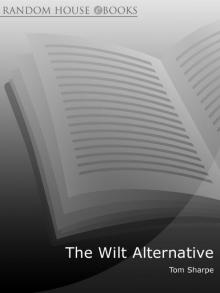 The Wilt Alternative:
The Wilt Alternative: The Great Pursuit
The Great Pursuit Ancestral Vices
Ancestral Vices The Midden
The Midden Vintage Stuff
Vintage Stuff The Throwback
The Throwback Grantchester Grind:
Grantchester Grind: Wilt on High:
Wilt on High: Riotous Assembly
Riotous Assembly Indecent Exposure
Indecent Exposure The Gropes
The Gropes Wilt in Nowhere:
Wilt in Nowhere: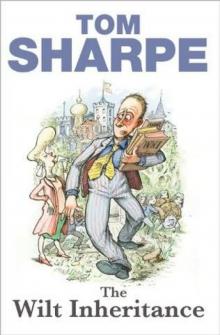 The Wilt Inheritance
The Wilt Inheritance Wilt:
Wilt: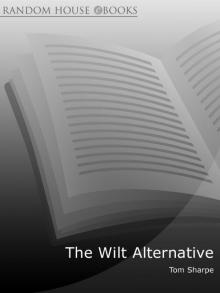 The Wilt Alternative
The Wilt Alternative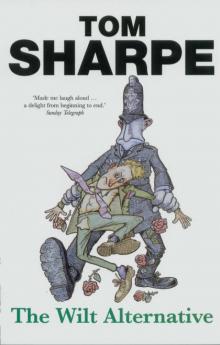 The Wilt Alternative w-2
The Wilt Alternative w-2 Grantchester Grind
Grantchester Grind Wilt on High
Wilt on High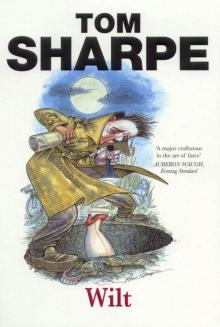 Wilt w-1
Wilt w-1 Wilt
Wilt The Wilt Inheritance (2010)
The Wilt Inheritance (2010) Wilt in Nowhere
Wilt in Nowhere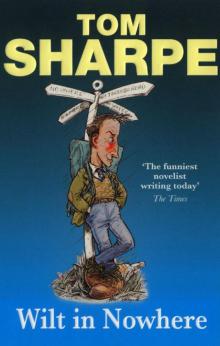 Wilt in Nowhere w-5
Wilt in Nowhere w-5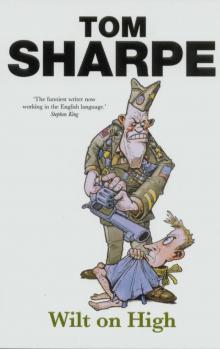 Wilt on High w-3
Wilt on High w-3